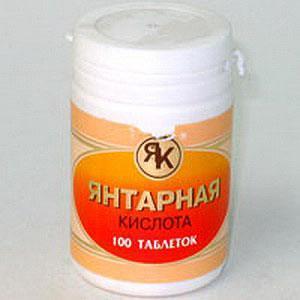Succinic acid for orchids as a development stimulant
 There are many tricks in caring for indoor flowers. So, succinic acid for orchids is like living water. It has a stimulating effect on all organs. As a result, the flower grows faster and throws out flower arrows. Acid cannot replace fertilizers, but it promotes their efficient assimilation. The drug is environmentally friendly and decomposes into the simplest elements in the ground.
There are many tricks in caring for indoor flowers. So, succinic acid for orchids is like living water. It has a stimulating effect on all organs. As a result, the flower grows faster and throws out flower arrows. Acid cannot replace fertilizers, but it promotes their efficient assimilation. The drug is environmentally friendly and decomposes into the simplest elements in the ground.
How to use succinic acid for orchids at home

Like no other drug, succinic acid will help:
- accelerate the growth and development of a young orchid;
- heal the substrate, restore balance;
- accelerates the conversion of fertilizers into biological form;
- strengthens the plant's immune system;
- accelerates the processes of photosynthesis.
The plant recovers in a short time, throws out arrows, blooms for a long time and magnificently.
Blooming orchid must be protected from contact with any insects. If a flower is pollinated, it will wither immediately.
All parts of the plant can be treated with succinic acid, and in different ways. The roots are immersed in the solution when transplanting. Depending on the condition of the plant, the roots are kept in solution from half an hour to several hours. Then they are dried and the orchid is transplanted into sterile soil. It is important to properly prepare the plant for transplantation, and then in a week you can see active root growth.
 The processing of sheets must be carried out with a damp cloth dipped in an acid solution so as not to create stagnant zones in the leaf axils. Do not leave droplets on the leaves.
The processing of sheets must be carried out with a damp cloth dipped in an acid solution so as not to create stagnant zones in the leaf axils. Do not leave droplets on the leaves.
The orchid will be grateful if it is sprayed with succinic acid for orchids from a spray bottle every 2-3 weeks. This stimulates the growth of new shoots. You can water the roots with the rest of the solution. The term of use of a home-made solution is no more than 3 days. Better to use a fresh product.
Preparation of working solution
 How to dilute succinic acid for an orchid depends on the form of the substance. It comes in tablets and powder. Therefore, for the desired concentration, 1 gram of acid is diluted in 5 liters of water.
How to dilute succinic acid for an orchid depends on the form of the substance. It comes in tablets and powder. Therefore, for the desired concentration, 1 gram of acid is diluted in 5 liters of water.
Plant tablets contain the active ingredient in an amount to be diluted in 500 milliliters of water. If there is a powder substance in the medicine cabinet, then you need to take a little powder at the tip of a knife and dissolve it in 0.5 liters of water. The solution cannot be prepared for future use. Succinic acid is an unstable substance; it decomposes into simple components in water and becomes ineffective.
Dissolve the substance in warm water with stirring. Add cold water to the required volume.
Do not store vegetables and fruits in a room where an orchid blooms. The emitted ethylene gas suppresses orchid blooms. Do not use other aerosols indoors.
How to feed an orchid
 Fertilizer for orchids is used with caution. Do not feed sick or only transplanted plants. Untapped fertilizer will only poison the soil.Due to the specific soil, liquid formulations can be used, but in dilution it is 3-4 times less than the recommended dose.
Fertilizer for orchids is used with caution. Do not feed sick or only transplanted plants. Untapped fertilizer will only poison the soil.Due to the specific soil, liquid formulations can be used, but in dilution it is 3-4 times less than the recommended dose.
Orchid feeding is stopped two weeks before flowering. During flowering, no feeding is done. Recommended liquid formulations fertilizers.
Bona Forte is considered the best fertilizer for orchids. Prolongs flowering up to six months, applied before and after flowering in greater dilution than instructed.
"Flora" is a natural fertilizer based on vermicompost, intended for foliar dressing
Pokon seramis granulate, long-lasting balanced fertilizer. Provides oxygen to the roots and regulates moisture in the soil. Using this composition allows you to water the orchids once a month.
By using succinic acid for stress stimulation and fertilization for healthy plants, long-blooming orchids can be produced.
I am interested in the dosage. The tablets are different.
I want to clarify the dosage. Tablets are 0.1, 0.25 g
To prepare 1 liter of working solution, 1 tablet of 0.25 g will be needed (it is better for them to wipe the leaves, and not water the orchid). For the concentrate, respectively, you need 4 tablets of 0.25 g per liter of warm water.
I have two orchids, one is actively blooming at the moment, and the second is already fading. I want to know if it is possible to water an orchid with succinic acid during flowering?
Succinic acid is used to stimulate flowering, so it is more advisable to water the flowers with a nutrient solution at the bud-laying phase. Phalaenopsis lovers and connoisseurs argue that watering during flowering can lead to the dropping of buds.
Hello, I bought an orchid when I was already sick, there was a piece of paralon in the center of the shop subtrate, they were in a very dry state, transplanted, no positive reaction for two weeks, only the leaves almost all turned yellow. I took it out of the pot, soaked the roots for half an hour in succinic acid and left it above the water, not in contact with the water of the roots. Will such a procedure help or is it better to plant her? There are few roots, but there are good ones
Better to plant the orchid in a special substrate. The roots can be treated with a growth stimulant, but it is better to cut the lowest leaf - it has almost wilted. Periodically wipe the remaining two leaves with succinic acid - through them the orchid will receive nutrients for recovery.